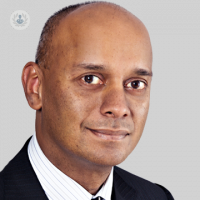What causes damage to the meniscus?
Written in association with:In one of our latest articles, Mr Michael Thilagarajah, a mightily distinguished consultant trauma and orthopaedic surgeon, tells us in what way the meniscus can be damaged, and reveals when a meniscus repair is required.

How can the meniscus get damaged?
The meniscus is a soft tissue that sits at the periphery of the contact area within the weight bearing part of the knee. The knee is not strictly a pure hinge joint, allowing movements in different directions while you bend and straighten. If you twist your knee, you can injure the meniscus, as it is possible for the meniscus to get caught in between the moving joint surfaces and be torn.
When is a meniscus repair required?
Once torn, the fragments of meniscus can get caught between the moving parts of the joint, causing pain. Most of these fragments need to be trimmed back out of the way, and meniscal repairs are reserved for patients who suffer very peripheral tears, as this type has the potential to heal. If the tear is suitable for repair, it can be stitched back and secured in its usual position.
How is a meniscus repair performed?
Generally speaking, a meniscal repair is, these days, always carried out through keyhole surgery. It is called an arthroscopy. Very small instruments are involved, one being a pen-sized camera, and the other being from a range of special instrumentation which can be used to manipulate the meniscus into position, and to then stitch it back.
The incisions in the skin required are less than half a centimetre, and, with careful manoeuvring, the repair can be performed.
What is recovery time like? What can patients expect after a meniscus repair?
The range of motion of the knee will be limited after a meniscus repair. Weight bearing is usually limited following this surgical intervention. The aim is to protect the meniscus while healing takes place, usually for between four to six weeks. After that, there is progressive physiotherapy to ensure that the muscles are rehabilitated and that the full range is regained.
Mr Michael Thilagarajah is a highly revered consultant trauma and orthopaedic surgeon. Make sure you book an appointment with him today via his Top Doctors profile if you have recently damaged your meniscus.


